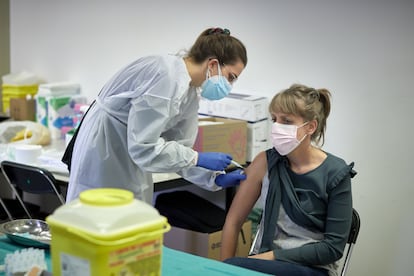Spain’s regions favor higher age limit for AstraZeneca vaccine
Madrid, Andalusia and Catalonia feel the government’s decision to restrict the coronavirus shots to people under 55 is too strict, while the WHO insists it is safe for over-65s

Following the Spanish government’s decision that the AstraZeneca Covid-19 vaccine will only be administered to people between the ages of 18 and 55, several regional leaders said they would seek to raise that threshold to 65.
Andalusian premier Juan Manuel Moreno and the deputy premier of the Madrid region, Ignacio Aguado, both said they would make this request at the Wednesday gathering of central and regional health officials known as the Inter-Territorial Council of the National Healthcare System, which meets every week to discuss coronavirus policy.
Catalonia’s health chief, Josep Maria Argimon, has not specified whether his government will formally ask to raise the age limit to 65, but on Wednesday he called the current threshold “too strict,” noting that the immune reaction of a 55-year-old is very similar to that of 65-year-old. “It’s very rare to see a different response. It’s true that there are no studies to explain the reaction in over-55s, but we feel that the vaccine should be administered to over-18s,” he said.

The reaction to the central government’s decision comes as the World Health Organization (WHO) insisted on Wednesday that “there are no reasons not to administer the AstraZeneca vaccine to people over 65,” in the words of Alejandro Cravioto, chairman of the expert committee advising the WHO on coronavirus vaccines.
Probe into Church officials
In Murcia, a regional daily has revealed that the bishop of Cartagena, José Manuel Lorca Planes, as well as other leading Catholic Church officials in the southeastern region, passed themselves off as chaplains of a senior care home in order to receive the coronavirus vaccine ahead of time. Prosecutors are now investigating whether the five individuals who cheated their way into getting early inoculations should be charged with crimes, La Opinión de Murcia reported.
Restaurants take fight to court
The regional high courts of Catalonia, Extremadura, Galicia, the Balearic Islands and the Valencia region are now considering legal challenges mounted by the food and drink industry in those regions, where bars and restaurants have been closed for weeks as part of coronavirus restrictions.
In the Basque Country, the justice system has already allowed these businesses to reopen on a provisional basis after judges found on Tuesday that bars and restaurants “do not appear to be an element that poses a certain and serious risk to public health at the moment.”
The Basque government will bring up the issue on Wednesday afternoon at the weekly meeting of health officials. Basque government spokesperson Bingen Zupiria questioned the ruling, saying that judges did not have enough time to conduct a rigorous analysis of the epidemiological data.
Speaking on the public station Radio Euskadi, Zupiria added that the decisions of the Basque executive are not taken on a whim. “No politician, much less the lehendakari [Basque premier], goes around thinking up ways to aggravate people.”
Andalusia: “explosion” of B.1.1.7 variant

Authorities in the southern region of Andalusia are warning about an imminent surge of the B.1.1.7 coronavirus variant first detected in Britain. The Andalusian premier, Juan Manuel Moreno, said on Wednesday that this strain still accounts for a minority of infections in the region, but that “it could become the dominant one in the coming three to four weeks.” Moreno said the strain’s incidence in the region is currently 20%, although in the provinces of Cádiz and Granada it is as high as 40%.
The Andalusian leader also said that mobility restrictions and business closures will be extended for one additional week instead of two, beginning on Saturday. Municipalities with a 14-day incidence rate of 500 cases per 100,000 people are under perimetral lockdown, and those with a rate of 1,000 and over must shut down all retail stores, bars and restaurants. Right now more than 66 of Andalusia’s municipalities have sealed their borders, and in over 31% of them all non-essential activities are closed.
Education
Education Minister Isabel Celaá said on Wednesday that only 32 learning centers, representing 0.11% of the total, are closed due to Covid-19 cases. Nearly 99% of classrooms are functioning normally and the third wave of the pandemic has caused fewer problems than the second one, she said.
“We congratulate ourselves for the effort and determination to keep learning centers open. We have taken stock of the epidemiological situation, and despite the current context the situation remains one of containment,” she said.
With reporting by Silvia Nortes and Pedro Gorospe.
English version by Susana Urra.
Tu suscripción se está usando en otro dispositivo
¿Quieres añadir otro usuario a tu suscripción?
Si continúas leyendo en este dispositivo, no se podrá leer en el otro.
FlechaTu suscripción se está usando en otro dispositivo y solo puedes acceder a EL PAÍS desde un dispositivo a la vez.
Si quieres compartir tu cuenta, cambia tu suscripción a la modalidad Premium, así podrás añadir otro usuario. Cada uno accederá con su propia cuenta de email, lo que os permitirá personalizar vuestra experiencia en EL PAÍS.
¿Tienes una suscripción de empresa? Accede aquí para contratar más cuentas.
En el caso de no saber quién está usando tu cuenta, te recomendamos cambiar tu contraseña aquí.
Si decides continuar compartiendo tu cuenta, este mensaje se mostrará en tu dispositivo y en el de la otra persona que está usando tu cuenta de forma indefinida, afectando a tu experiencia de lectura. Puedes consultar aquí los términos y condiciones de la suscripción digital.









































